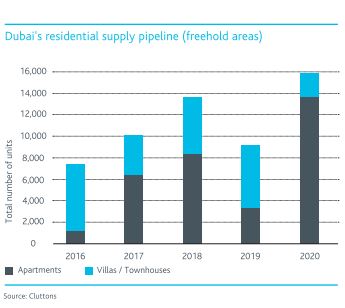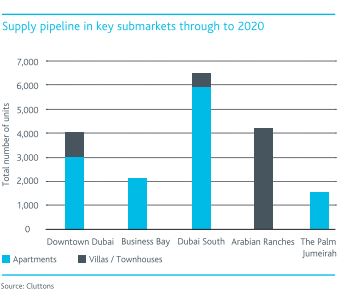- City Fajr Shuruq Duhr Asr Magrib Isha
- Dubai 04:20 05:42 12:28 15:53 19:08 20:30
Rents in Dubai remained stable in the third quarter 2015, brining comfort to the residents, Cluttons said.
Average rents fell 3.2 per cent in the past one year, with three-bed villas in the Springs, Jumeirah Village, Al Reem, Falcon City and The Villa reporting declines in the nine month period, the consultancy said in its “Dubai 2015/16 Winter Residential Property Market Outlook.”
“Tenants can take comfort in the fact that rents have for the most part stabilised, with no growth recorded during the third quarter. The biggest declines recorded by low-end three-bedroom villas, encompassing the Springs, Jumeirah Village, Al Reem, Falcon City and The Villa, where rents slipped by nearly six per cent between January and September,” it added.
Emirates 24/7 reported in August 2015 that the Real Estate Regulatory Agency (Rera) rent index will no longer be updated every four months, as done since 2009 when it was launched.
Read: Your Dubai rent index update once a year: DLD
Faisal Durrani, Head of Research, Cluttons, said the rent calculator still appears to be out of sync with market reality.
“It [index] has served as a useful barometer for tenants and landlords since 2009 but the increasingly complex nature of Dubai’s residential market suggest the city may need to find an alternative to maintain transparency and investment volumes into the buy to let sector.”

“Ironically, there are landlords in the market who will be willing to accept rents lower than the official Rera rent calculator for vacant properties, which means it may actually end up being cheaper for households to relocate in some cases,” the report said.
Prices set to fall
Cluttons said price growth appears to be slowing, with a bottoming out in the market likely to happen at the tail of 2016.
It revealed values dipped -0.8 per cent for apartments and 0.5 per cent for villas in the third quarter 3, marking the fifth consecutive quarter of price falls.
“Price declines in the region of 3% to 5% are expected over the next 12 months, impacted by faltering global growth and supply levels creeping upwards,” the consultancy said.
It, however, emphasised that infrastructure investments planned around the looming Expo 2020 will boost the rate of job creation and the rate of new households created.

Off plan remains popular
Majority of residential sub-markets reported little or no change in values in 2015, which was partly attributed to the steady appeal of apartments to the buy-to-let investment community.
“We’ve seen the popularity of off-plan property sales persist, partly fuelled by the fact that off-plan residential property prices are often 20 to 30 per cent lower than completed secondary stock, which in essence might allow buyers to bypass some of the stringent lending criteria and also possibly avoid the need for a mortgage altogether,” Morgan said.
Talking on the affordable housing issue, Durrani said despite several developers having brought schemes to the market that they present as being “affordable”, true affordable housing remains a vastly underserved segment of the market.
“The authorities need to formalise the definition of affordable housing, in terms of those who could qualify and the type of housing that needs to be created, otherwise there is a real danger that the term ‘affordable’ will be permanently diluted.”
In an interview with this website in March 2015, Abdulla Mohammed Rafia, Assistant Director General for Engineering and Planning Sector, Dubai Municipality, defined affordable housing in Dubai as “living space for people whose salary is between Dh3,000 to Dh10,000 per month”.
Read: Dubai to build affordable houses for people earning Dh3,000 to Dh10,000 per month
Referring to the analysis carried out by Cluttons on the UAE Ministry of Economy’s 2008 Household Income Survey, average annual expat incomes across the UAE currently stand at around Dh199,000 with average residential rents in freehold areas at the end of third quarter 2015 stood at Dh181,000 per annum, highlighting the disparity between incomes and the cost of housing.
“In the UAE this is approximately Dh600,000 to Dh800,000, which would typically buy a studio or one bedroom apartment in peripheral submarkets such as International City, International Media Production Zone, Dubailand or Dubai Silicon Oasis, leaving many people little option but to continue renting,” Durrani added.
![]() Follow Emirates 24|7 on Google News.
Follow Emirates 24|7 on Google News.